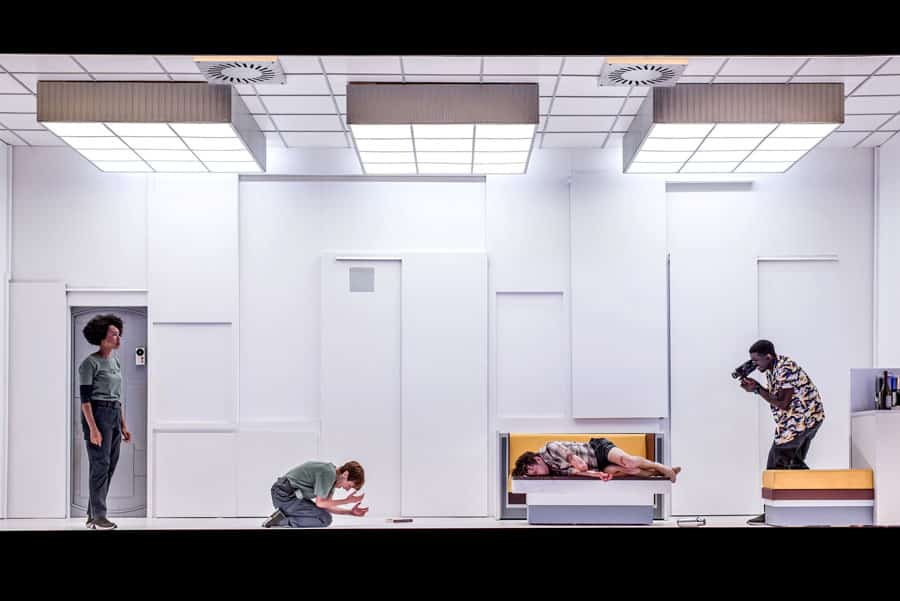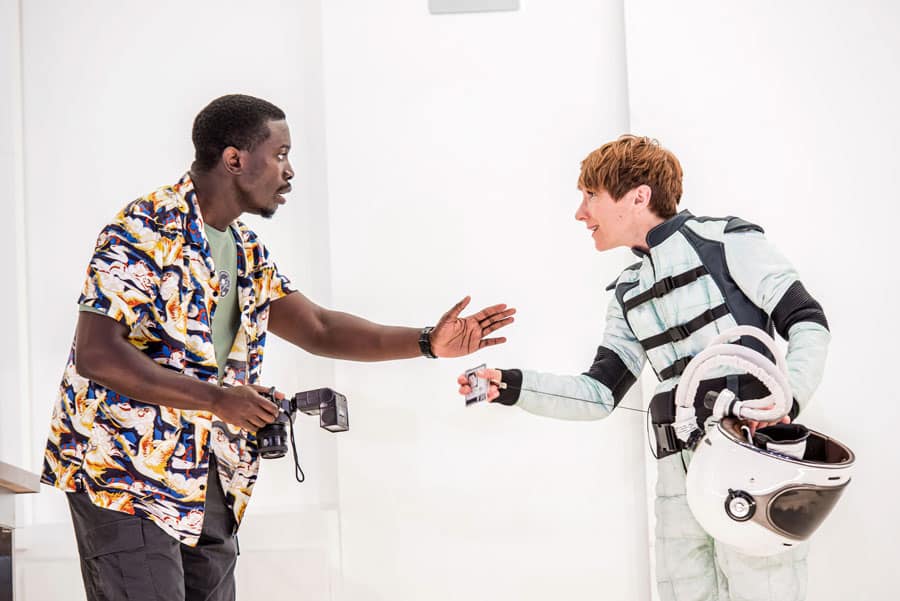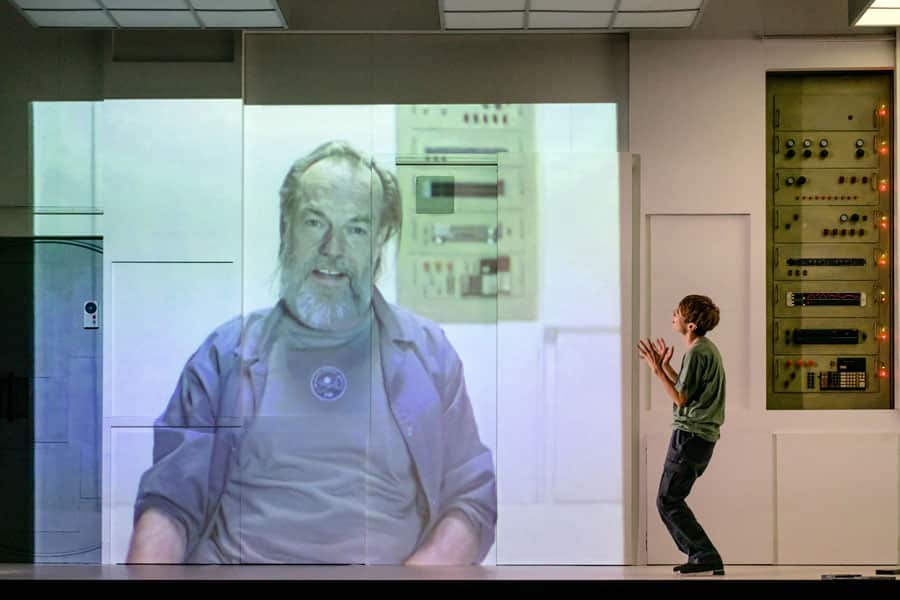NEWS TICKER
REVIEW: Solaris, Lyric Hammersmith ✭✭✭✭
Published on
October 17, 2019
By
julianeaves
Julian Eaves reviews Solaris now playing at the Lyric Hammersmith.

Jade Ogugua, Polly Frame, Keegan Joyce and Fode Simbo in Solaris. Photo: Mihaela Bodlovic Solaris
Lyric Theatre, Hammersmith
14th October 2019
4 Stars
Book Tickets
'It is a riddle, wrapped in a mystery, inside an enigma', said Churchill of Russia. He might well have been thinking of this strange science-fiction story by the Lvov-born Jewish-heritage Pole, Stanislaw Lem, which burst upon the international scene in the post-Stalin thaw in 1961, and which was filmed nine years later so memorably by Andrei Tarkovsky. In the late 1970s, the film - acclaimed as one of the finest in that genre ever made - was screened by BBC TV and made an indelible impression upon me. Watching recently the Soderbergh remake from 2002 and now this brilliant stage adaptation by writer David Greig and director Matthew Lutton, it is startling to see just how deeply Tarkovsky's version of the tale penetrated into my memory.

Fode Simbo and Polly Frame. Photo: Mihaela Bodlovic
All of this is relevant because the tale is above all else a meditation upon the nature of recollection and its hold over us. Like many an agnostic or atheist before him, Lem is obsessed by the ineffable and mysticism: in fact, this yarn of personal loves and torments set on a space station orbiting an exotic distant ocean-covered planet may be read, plausibly, as a metaphor for the role of religion (ie. Christianity) in the Soviet bloc, and for much else besides: science vs. the passions; the relationship between mankind and nature; free will and predestination; the nature of the self; and more....

Keegan Joyce. Photo: Mihaela Bodlovic
In Hyemi Shin's set and costume design, affinities with the film abound: an elongated 'letter-box' illuminated acting area recalls the exhibition format of the film, as well as its many languorous panning shots; transitions between scenes are achieved through blackout cut-aways flashing ghostly digital images of heaving waves (magnificent Lighting by Paul Jackson, with realisation by Stephen Hawker); and Jethro Woodward's composition and sound design echoes the Soviet film (where Eduard Artemeyev mixed electronic scoring with J S Bach, Woodward mixes his electronics with Vivaldi).

Hugo Weaving and Polly Frame. Photo: Mihaela Bodlovic
The acting style is very different, however. With its roots in the 'direct' style of Australian theatre (Lutton is AD from the famous Malthouse Theatre in Perth, Western Australia), and filtered through the bold manner of the Royal Lyceum, Edinburgh (where Greig is artistic director), the show has acquired a lively, warm, easy-going naturalness that sits a little oddly in the cool, hyper-modern imaginative world we are shown. In fact, for much of the time, there is an almost soap-opera-ish matter-of-factness about the speech and behaviour of the cast which tends to rob the action of much of its epic sweep. Lutton paces their exchanges briskly, which - in the first half of the presentation - often seems unnecessarily rushed; but, in the second half, the greater intensity of the drama benefits from this speed.
Polly Frame stands out as Kris, a visitor to the space station; she is sent to investigate the crew's moral fibre (so far, so very Ninotchka) and quickly falls subject herself to the planet's weird seductiveness. She has a powerful and yet boyish stage presence, as well as an elfin, mercurial manner that is suggestive of more than just the human. This makes her a great match for Keegan Joyce's harried Ray, a 'visitor' sent by the planet in the form of her deceased lover. In contradistinction to Kris' willingness to engage with Solaris, Jade Ogugua's Satorious is coldly dismissive of the place's troublesome habit of making physical reality of their most influential memories: she totally ignores her own 'visitor', a dead daughter (played by Lily Loya or Talia Sokal). She is ably supported in this mission by Fode Simbo's Snow, and the video projections of Hugo Weaving's now deceased captain Gibarian (why do these stories always have to have a dead captain?). Stories such as this as more than exciting narratives, they are modern myths. It is in the nature of myths to be capable of almost unlimited interpretation.

Keegan Joyce and Fode Simbo. Photo: Mihaela Bodlovic
As for the audience reaction, well, everyone, it seems, can take away from their antics just about whatever they wish. For me, one of the most enduring impressions is that the 'puppet' visitors from the planet Solaris are no less limited in their actions and thoughts and feelings than the 'free' human occupants of the space station. And if that is not meant to be an allegory for life under communist dictatorship, I do not know what is. But this story is about so much more: ultimately, it is, in fact, a debate about the very nature and purpose of creation and life itself.
Go on a journey to Solaris, and you may find yourself not wanting to come back.
© BRITISHTHEATRE.COM 1999-2024 All Rights Reserved.
The BritishTheatre.com website was created to celebrate the rich and diverse theatrical culture of the United Kingdom. Our mission is to provide the latest UK theatre news, West End reviews, and insights into both regional theatre and London theatre tickets, ensuring enthusiasts can stay up to date with everything from the biggest West End musicals to cutting-edge fringe theatre. We are passionate about encouraging and nurturing the performing arts in all their forms.
The spirit of theatre is alive and thriving, and BritishTheatre.com is at the forefront of delivering timely, authoritative news and information to theatre lovers. Our dedicated team of theatre journalists and critics works tirelessly to cover every production and event, making it easy for you to access the latest reviews and book London theatre tickets for must-see shows.